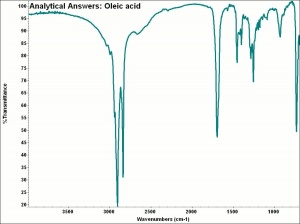Difference between revisions of "Oleic acid"
(username removed) |
(username removed) |
||
| Line 1: | Line 1: | ||
== Description == | == Description == | ||
| − | A clear, oily, mono-unsaturated fatty acid that occurs naturally in almost all animal and vegetable fats and oils. As the glyceride, oleic acid is a basic foodstuff. Oleic acid darkens on exposure to light and turns rancid on exposure to air. It can be hydrogenated to form [http://cameo.mfa.org/materials/fullrecord.asp?name=stearic | + | A clear, oily, mono-unsaturated fatty acid that occurs naturally in almost all animal and vegetable fats and oils. As the glyceride, oleic acid is a basic foodstuff. Oleic acid darkens on exposure to light and turns rancid on exposure to air. It can be hydrogenated to form [http://cameo.mfa.org/materials/fullrecord.asp?name=stearic%20acid stearic acid] or saponified with alkalis, such as [http://cameo.mfa.org/materials/fullrecord.asp?name=potassium%20hydroxide potassium hydroxide], or [http://cameo.mfa.org/materials/fullrecord.asp?name=triethanolamine triethanolamine], to make soaps. Oleic acid is also used to make [http://cameo.mfa.org/materials/fullrecord.asp?name=Turkey%20red%20oil Turkey red oil], to waterproof textiles, to oil [http://cameo.mfa.org/materials/fullrecord.asp?name=wool wool], and in the manufacture of polishing compounds. |
== Synonyms and Related Terms == | == Synonyms and Related Terms == | ||
| Line 47: | Line 47: | ||
== Authority == | == Authority == | ||
| − | * | + | * Matt Roberts, Don Etherington, ''Bookbinding and the Conservation of Books: a Dictionary of Descriptive Terminology'', U.S. Government Printing Office, Washington DC, 1982 |
| − | * | + | * G.S.Brady, ''Materials Handbook'', McGraw-Hill Book Co., New York, 1971 Comment: p. 560 |
| − | * | + | * Richard S. Lewis, ''Hawley's Condensed Chemical Dictionary'', Van Nostrand Reinhold, New York, 10th ed., 1993 |
| − | * | + | * ''The American Heritage Dictionary'' or ''Encarta'', via Microsoft Bookshelf 98, Microsoft Corp., 1998 |
| − | * | + | * ''The Merck Index'', Susan Budavari (ed.), Merck Research Labs, Whitehouse Station, NJ, 12th Edition, 1996 Comment: entry 6965; RI = 1.4585 |
| − | * | + | * Random House, ''Webster's Encyclopedic Unabridged Dictionary of the English Language'', Grammercy Book, New York, 1997 |
[[Category:Materials database]] | [[Category:Materials database]] | ||
Revision as of 07:32, 24 July 2013
Description
A clear, oily, mono-unsaturated fatty acid that occurs naturally in almost all animal and vegetable fats and oils. As the glyceride, oleic acid is a basic foodstuff. Oleic acid darkens on exposure to light and turns rancid on exposure to air. It can be hydrogenated to form stearic acid or saponified with alkalis, such as potassium hydroxide, or triethanolamine, to make soaps. Oleic acid is also used to make Turkey red oil, to waterproof textiles, to oil wool, and in the manufacture of polishing compounds.
Synonyms and Related Terms
cis-9-octadecenoic acid; red oil; elaine oil; octadecenoic acid; rapic acid; oleinic acid
Other Properties
Soluble in ethanol, ether and most organic solvents. Insoluble in water.
Iodine no. = 89.9 Acid number = 198.6
| Composition | CH3(CH2)7CH:CH(CH2)7COOH |
|---|---|
| CAS | 112-80-1 |
| Melting Point | 4 |
| Density | 0.895 |
| Molecular Weight | mol. wt. = 282.5 |
| Refractive Index | 1.4599 |
| Boiling Point | 286 |
Hazards and Safety
Combustible. Flash point = 189 C
LINK: International Chemical Safety Card
Authority
- Matt Roberts, Don Etherington, Bookbinding and the Conservation of Books: a Dictionary of Descriptive Terminology, U.S. Government Printing Office, Washington DC, 1982
- G.S.Brady, Materials Handbook, McGraw-Hill Book Co., New York, 1971 Comment: p. 560
- Richard S. Lewis, Hawley's Condensed Chemical Dictionary, Van Nostrand Reinhold, New York, 10th ed., 1993
- The American Heritage Dictionary or Encarta, via Microsoft Bookshelf 98, Microsoft Corp., 1998
- The Merck Index, Susan Budavari (ed.), Merck Research Labs, Whitehouse Station, NJ, 12th Edition, 1996 Comment: entry 6965; RI = 1.4585
- Random House, Webster's Encyclopedic Unabridged Dictionary of the English Language, Grammercy Book, New York, 1997
